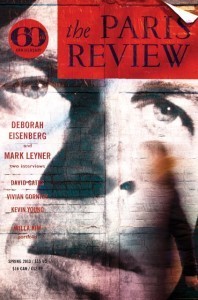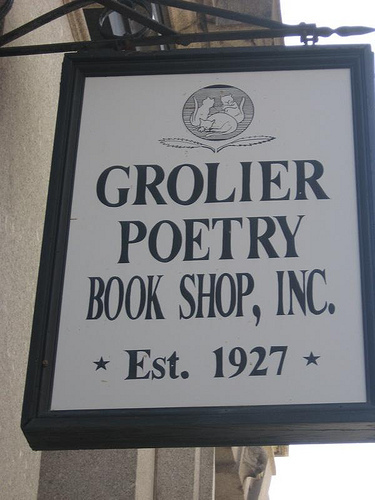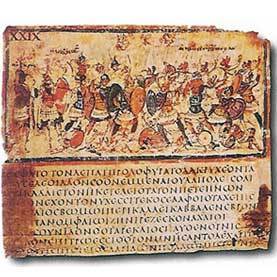The Paris Review's Blog, page 843
March 1, 2013
Dating the Iliad, and Other News
Geneticists estimate that the Iliad was written in 762 B.C., “give or take fifty years.” This squares with what classicists believe, too.
Barnes & Noble says that rumors of its death are greatly exaggerated.
Today in fearless luxury, these bespoke bindings are very beautiful.
And speaking of books as status symbols: the book in medieval portraiture.
The critics have spoken! The winners of the 2012 National Book Critics Circle awards are: Ben Fountain, Billy Lynn’s Long Halftime Walk (fiction); Andrew Solomon, Far from the Tree (nonfiction); Leanne Shapton, Swimming Studies (autobiography); Marina Warner, Stranger Magic (criticism); Robert Caro, The Passage of Power (biography); and D. A. Powell, Useless Landscape, or A Guide for Boys (poetry).
February 28, 2013
Gossip Archaeology with Edmund White
 I had planned my disclaimer before he even opened the door. What kind of an idiot, I had realized belatedly, brings noted francophile and former Paris-dweller Edmund White bootleg, neon, NYC-made macaroons for tea at his apartment? “Mr. White, I am so embarrassed ...” I never had a chance to tell him. He was kind and warm, thrilled with the fat, ersatz cookies, even claiming he loved them, got them himself sometimes. We sat down together in White’s living room with a pot of English tea and two Fiesta Ware teal-colored teacups, me on the couch facing him, in one of a pair of battered brown club chairs. He was wearing a pale-blue checkered shirt and navy pants. I’d interrupted his taxes, visible on the den table.
I had planned my disclaimer before he even opened the door. What kind of an idiot, I had realized belatedly, brings noted francophile and former Paris-dweller Edmund White bootleg, neon, NYC-made macaroons for tea at his apartment? “Mr. White, I am so embarrassed ...” I never had a chance to tell him. He was kind and warm, thrilled with the fat, ersatz cookies, even claiming he loved them, got them himself sometimes. We sat down together in White’s living room with a pot of English tea and two Fiesta Ware teal-colored teacups, me on the couch facing him, in one of a pair of battered brown club chairs. He was wearing a pale-blue checkered shirt and navy pants. I’d interrupted his taxes, visible on the den table.
We’d been put in touch by Kathryn Hamilton, press attaché of the Cultural Services at the French Embassy in regards to the Marcel Proust exhibit they organized with the BnF at the Morgan Library for the upcoming centennial of Swann’s Way. This was our initial point of contact, at least. Paris gossip was more pressing. I’d just gotten back from the city where White had lived for many years, the subject of his upcoming memoir, Inside a Pearl. He’d initially wanted to call it Paris Gossip, but the publisher wouldn’t have it. They wanted more depth. “I don’t think it will ever be published in France,” White told me, because of French invasion-of-privacy laws. “I used to call myself an archaeologist of gossip,” he said. “That’s sort of Proust, too, not to make a comparison between my humble self and the great Proust.”
Literary Vinyl
 This is a niche we can get behind: so-called literary vinyl, defined by the Times Literary Supplement blog as “spoken word LPs, singles, and those oddly appealing 10-inch discs.” Collector Greg Gatenby is selling off his 1,700-strong collection for $80,000. But for those of us who grew up listening to 78s of A Child’s Christmas in Wales and Bread and Jam for Frances, the memories are, as the credit-card commercials would say, priceless.
This is a niche we can get behind: so-called literary vinyl, defined by the Times Literary Supplement blog as “spoken word LPs, singles, and those oddly appealing 10-inch discs.” Collector Greg Gatenby is selling off his 1,700-strong collection for $80,000. But for those of us who grew up listening to 78s of A Child’s Christmas in Wales and Bread and Jam for Frances, the memories are, as the credit-card commercials would say, priceless.
Southern Holiday, Part 2
A bricked-in tree at Mepkin Gardens.
A week before I began my holiday road trip in December, I learned that in 1936 Time Life’s founder and publisher, Henry Luce, and his wife, the flamboyant Clare Booth Luce, purchased a three-thousand-acre former slave plantation in Berkeley County, South Carolina, only twenty miles from the poverty-stricken region where Smith made his classic “Nurse Midwife” for Life in 1951. The Luces made Mepkin Plantation their vacation estate.
Did Smith know this? Is that why he fought so hard to celebrate the African American Maude Callen amid pages of Life’s whitewashed Madison Avenue ads, to shove the contradictions in Luce’s face? It’s hard to know, but I think probably not. Smith left behind voluminous bitter letters to replaceable bureaucrats, but I haven’t seen any to moguls. He tended to make dragons out of windmills.
What is known is that, in 1949, the Luces donated part of Mepkin Plantation to the Trappist Order of Gethsemani of Kentucky, creating Mepkin Abbey. When Henry died, in 1967, his body was laid to rest in the property’s gardens. After Clare’s death in 1987, her body was buried next to his. As a serial graveyard explorer, I knew I had to see these graves, which, together with Callen’s abandoned and crumbling clinic, form an unlikely set of Berkeley County monuments to Life magazine’s midcentury power. Read More »
February 27, 2013
Many Happy Returns, John Steinbeck
Low Boil
 To the hundreds of thousands in Asia who start each morning with a bowl of congee—and who, every evening, set their rice cooker to a low boil so that more congee is ready by the next day—it would probably seem strange that I’m about to spend so much time talking about the dish. It’s like someone rambling about corn flakes here. But in Manhattan, congee’s hard enough to find north of Houston Street, let alone beyond city limits. My tiny corner of the world feels like it’s in the perpetual midst of a congee shortage, and sometimes congee’s all I want to eat.
To the hundreds of thousands in Asia who start each morning with a bowl of congee—and who, every evening, set their rice cooker to a low boil so that more congee is ready by the next day—it would probably seem strange that I’m about to spend so much time talking about the dish. It’s like someone rambling about corn flakes here. But in Manhattan, congee’s hard enough to find north of Houston Street, let alone beyond city limits. My tiny corner of the world feels like it’s in the perpetual midst of a congee shortage, and sometimes congee’s all I want to eat.
Topped with some mix of scallions, ginger, peanuts, and cilantro, the savory white-rice gruel (or more flatteringly, porridge) is often served in cast iron bowls, sometimes ladled into smaller portions and shared among a group. Read More »
Digital Book Signings, and Other News
“Why do so many novels get adapted into screenplays at all, when their essential quality, the persuasive and enthralling power of prose, always must be stripped—and the final product is always left in some state of diminishment?” Ian Crouch on that modern institution, the miniseries.
At three P.M., Toni Morrison is conducting a “digital book signing.” (Really more of a Google hangout, but still.)
What are the ten best books you’ve never read? (I, for one, have never finished The Ginger Man.)
While we’re ranking stuff: your favorite film about a writer? (Barton Fink.)
“Rather than limiting discussion of a certain book to a digital room in e-readers such as the Kobo or Kindle, Socialbook lets all your friends in your personal digital network know what you’re reading and invites them into the conversation. Furthermore, Socialbook puts participants right into the text of the book, where they can scribble notes in the digital margin of the book, highlight portions, pull out quotes and even rearrange the content.” To coin a phrase, “Plus ça change, plus c’est la même chose.”
Introducing Our Sixtieth-Anniversary Issue!
 If you happened to be in Paris this past month, and walked past the public toilets at the corner of rue Alexandre Dumas and boulevard de Charonne, you may have noticed a giant picture of George Plimpton’s face gazing out over the 11th arrondissement with great benignancy and just the slightest possible suggestion of a gueule de bois. This illegal memorial to our founding editor, by the poster artist JR, celebrates the sixtieth birthday of The Paris Review in the city of her birth.
If you happened to be in Paris this past month, and walked past the public toilets at the corner of rue Alexandre Dumas and boulevard de Charonne, you may have noticed a giant picture of George Plimpton’s face gazing out over the 11th arrondissement with great benignancy and just the slightest possible suggestion of a gueule de bois. This illegal memorial to our founding editor, by the poster artist JR, celebrates the sixtieth birthday of The Paris Review in the city of her birth.
It happens also to be the cover of our special anniversary issue.
In which:
Deborah Eisenberg talks failure and perseverance with Catherine Steindler—
You write something and there’s no reality to it. You can’t inject it with any kind of reality. You have to be patient and keep going, and then, one day, you can feel something signaling to you from the innermost recesses. Like a little person trapped under the rubble of an earthquake. And very, very, very slowly you find your way toward the little bit of living impulse.
Mark Leyner talks process with Sam Lipsyte—
When I was at Brandeis, I met this girl named Rachel Horowitz, and we really loved reggae music. This was in 1970. We decided, Why don’t we go to Jamaica? So we went and we got some really nifty little bungalow place in Montego Bay—very cheap, because we couldn’t afford much then. And it had a little pool for the couple of bungalows and a little kitchen. And I’d never really stayed in place like this on my own, with a girlfriend. I mean, nothing quite like that. I had been away the year before with another girl, took a trip to Israel and in Europe and things, but I’d never been in a groovy tropical place like this. And we had a car, so one day we drove into town and got some stuff, because we had a refrigerator and a pantry. We also got some Red Stripe. And this guy at Brandeis had given me some acid to bring to Jamaica. This guy was like the Johnny Appleseed of acid. He would take a load of acid and explain an album cover to you for just hours. He would take a Hot Tuna album that you had seen a trillion times and he would begin to examine it with these long lectures that were like Fidel Castro giving a lecture at the Sorbonne. He also once set his hand on fire and watched it for quite a while because he was so high. That really impressed me. Anyway, this guy had given me some acid and one night, when Rachel and I were just hanging out in the hotel, I said, You wanna take some? She said no. I said, Okay, I think I’m going to. So I took it, and it comes on, and then I want a beer and I go into the little kitchen, and by now the acid’s full on and this guy, this big flying cockroach, like a palmetto bug—you know those things?—it crawls out of the six-pack, and to me, at the time, it was like a pterodactyl, in some Raquel Welch movie set in prehistoric times. According to Rachel, I batted this thing in the little kitchen for, like, five hours. She heard pans and things breaking and she said I emerged with a torn shirt, sweaty—and victorious. That’s what my experience of writing The Sugar Frosted Nutsack was like. Battling this pterodactyl in the closet with a pan. At a certain point, of course, the book attained a mind of its own, a subjectivity or an autocatalytic, machinelike quality.
And Willa Kim shows us her store of Paris Review erotica.
Plus, fiction by Adelaide Docx, David Gates, Mark Leyner, Ottessa Moshfegh, Adam O’Fallon Price, and Tess Wheelwright. Poetry by Sylvie Baumgartel, Peter Cole, Stephen Dunn, John Freeman, Tony Hoagland, Melcion Mateu, Ange Mlinko, Frederick Seidel, and Kevin Young. Essays by Vivian Gornick and David Searcy.
On newsstands March 15.
February 26, 2013
House of Poesy: At the Grolier Poetry Book Shop
 The Grolier Poetry Book Shop in Cambridge, Massachusetts, is both a misnomer and an anomaly. It has long dedicated itself to the task of promoting the reading and writing of poetry and has, for eighty-five years, served as a niche for poets the world over. While its reputation has bloomed over the years, thanks largely to word-of-mouth praise, it has never fared well financially, partly due to competition from larger stores and the Internet, partly because poetry has never been popular with the masses, and partly because its founder seems to have done everything in his power to ensure that his store not be turned into a business.
The Grolier Poetry Book Shop in Cambridge, Massachusetts, is both a misnomer and an anomaly. It has long dedicated itself to the task of promoting the reading and writing of poetry and has, for eighty-five years, served as a niche for poets the world over. While its reputation has bloomed over the years, thanks largely to word-of-mouth praise, it has never fared well financially, partly due to competition from larger stores and the Internet, partly because poetry has never been popular with the masses, and partly because its founder seems to have done everything in his power to ensure that his store not be turned into a business.
Located on Plympton Street in Harvard Square, the Grolier occupies just 404 square feet of space and is dwarfed by the neighboring Harvard Book Store. A white square sign with meticulous black lettering juts out near the top of the store entrance. The font size decreases from top to bottom, much like on an eye exam chart, and one can just make out, at the very top, a finely done illustration of three cats (or is it the same cat?) dozing, grooming, and turning their backs on the viewer.
Upon ascending a small flight of steps, one is greeted by the sight of an abundance of colorful spines—approximately fifteen thousand—neatly arranged against nearly every flat surface of the shop. These volumes are neatly balkanized into several categories, including anthologies, used, African-American, early English, Irish, Russian, Chinese, Iranian, Indian, Latin, classical Greek, Japanese, Korean, East European, Spanish, and Catalan.
Above the towering shelves are approximately seventy black and white photos (many courtesy of the photographer Elsa Dorfman) of poets and other members of the literati for whom the Grolier has served as a meeting place for well over half a century. Among the Grolier’s most illustrious visitors, most of whom are smiling or gazing sagely and serenely ahead in the photos, are T. S. Eliot, Robert Lowell, Elizabeth Bishop, e. e. cummings, Marianne Moore, James Tate, Donald Hall, and Helen Vendler.
Off to one side at the front of the store sits a lean shelf of chapbooks and a donation jar; a small note says that the chapbooks have been generously donated by the author and that monetary contributions to the shop would be greatly appreciated. Directly across this bookcase is the cash register, propped up on a desk and flanked by sundry items, including bookmarks, promotional literature, pamphlets, business cards, and commemorative pens. On the wall right adjacent to the register hangs a certificate from Boston Magazine honoring the Grolier as the best poetry store of 1994. Read More »
Happy Birthday, Victor Hugo
The Paris Review's Blog
- The Paris Review's profile
- 305 followers








